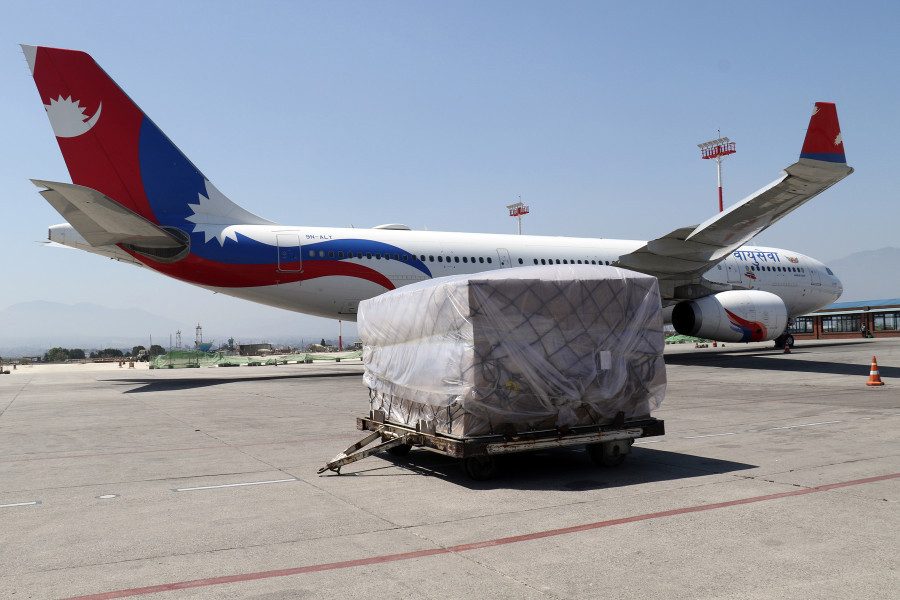Money
Government yet to pay Nepal Airlines Rs 20.4 million in charter costs
The carrier could really use the money as its revenues have been slashed by the pandemic, officials say.
Prithvi Man Shrestha
Nepal Airlines Corporation has not received Rs18 million in charter costs for a flight it conducted to bring medical goods from Guangzhou, China supplied by the controversial Omni Business Group even though nearly three months have passed, airline officials said.
The government had chartered the flight on behalf of Omni even though the supplier should have done so as per the contract. The Department of Health Services had promised to pay the charter costs right after the shipment was delivered, but it has not happened despite several follow-ups, officials at the national flag carrier said.
According to the corporation, the government owes it around Rs18 million for flying in medical goods from Guangzhou and another Rs2.4 million for four charter flights to carry swabs from Nepalgunj to Kathmandu.
“We have been following up with the department and the Ministry of Health and Population for payment, but we have not received any money,” said Archana Khadka, spokesperson for the airline.
Nepal Airlines is hard up for cash amid the Covid-19 pandemic when the global aviation industry is struggling to survive, and the loss of its income sources—from both flight operations and ground handling services at Tribhuvan International Airport.
“The issue is still under study,” said Dipendra Raman Singh, director general at the department without elaborating. The deal with Omni was made during the tenure of his predecessor Mahendra Shrestha.
On March 26, the Department of Health Services contracted with Omni to supply medical equipment necessary to fight the Covid-19 pandemic, and the first batch was delivered on March 29. The rest of the goods on order were to be delivered by April 5.
But on April 1, the government unilaterally terminated the contract with Omni following charges of irregularities after it appeared that the price of most of the goods was several times higher than what competing medical suppliers had quoted.
The termination of the contract complicated payment to Nepal Airlines Corporation.
“As the charter flight was conducted based on the request of the Health Ministry and the Department of Health Services, we are seeking payment from these government agencies,” said an official of the national flag carrier on condition of anonymity as he is not authorised to speak to the media.
Although the outstanding amount is not so large compared to the state-owned carrier's liabilities, it will go a long way when revenues have been slashed by the virus, officials at the corporation said.
The corporation has taken loans totalling Rs33 billion (Rs24 billion from the Employees Provident Fund and Rs9 billion from the Citizen Investment Trust) to purchase new planes for international flights. But it has not been able to pay quarterly instalments on the loans from January.
In April, the corporation’s board decided to request both lenders to waive interest for six months. The average interest rate being paid by the corporation to these lenders is 10.5 percent. This means the corporation will receive an interest waiver of Rs1.7 billion if they agree to the request.
Since the beginning of the autumn travel rush in October last year, full-fare passengers had been filling its flights which pulled the company back from the brink of bankruptcy. The autumn earnings allowed the teetering national flag carrier to repay creditors breathing down its neck.
It had paid Rs572 million to the Citizen Investment Trust and Rs440 million to the Employees Provident Fund in January, after having missed three quarterly instalments. In the last fiscal year 2018-19, the corporation had incurred a net loss of Rs1.96 billion and its cumulative loss stands at Rs5.53 billion, according to the Annual Status Review of Public Enterprises recently released by the Finance Ministry.
The corporation has projected that it will lose potential income of Rs6 billion till the end of the current fiscal year from mid-April due to the ongoing flight disruptions.
Ground handling is a vital income for the national flag carrier, and it has failed to make hardly any income from this service as the country has suspended all flights since March 22, except for charter flights for humanitarian purposes and supply of medical goods. In the last fiscal year, it earned nearly Rs4 billion from ground handling services.
“The corporation has also taken some cost cutting measures such as reducing the salary of foreign pilots by 40-50 percent,” said the corporation official.
The carrier employs around 1,400 people. "In order to cut expenses, we have given unpaid leave to a number of highly paid pilots, those who earn more than Rs1 million monthly," Ganesh Bahadur Chand, deputy managing director of the corporation, had told the Post in April.




 20.12°C Kathmandu
20.12°C Kathmandu














